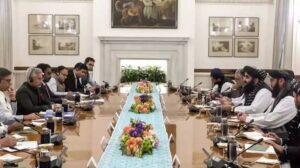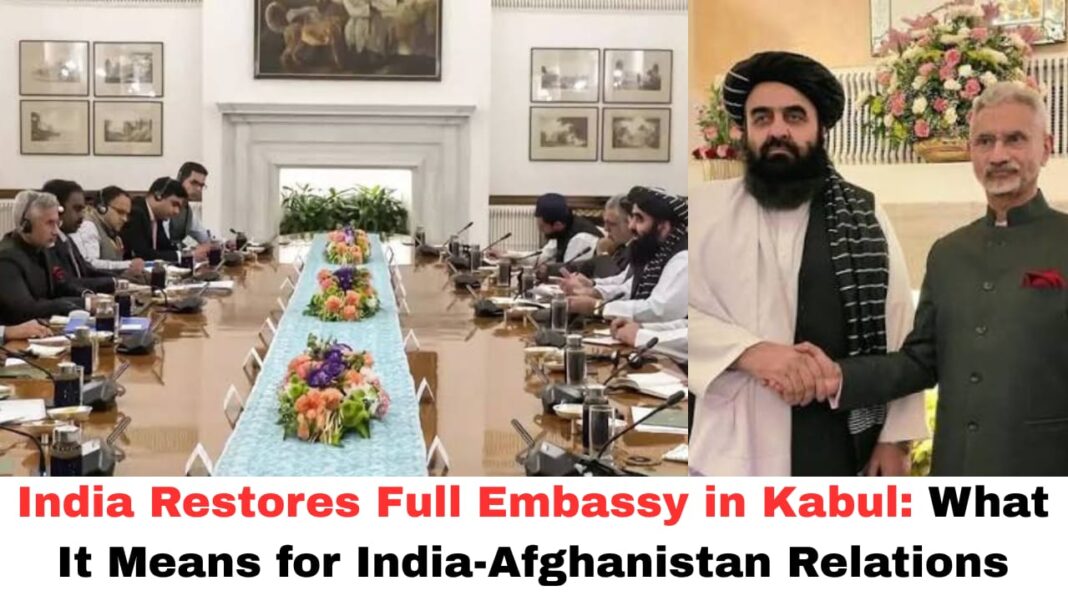Digital News Guru National Desk:
India Restores Embassy in Kabul: A Diplomatic Pivot amid Strategic Realignment
In a significant diplomatic shift, India has announced that it will upgrade its technical mission in Kabul into a full-fledged embassy, signaling deeper engagement with Afghanistan’s Taliban-led regime. Indian External Affairs Minister S. Jaishankar made the announcement following talks with Taliban Foreign Minister Amir Khan Muttaqi during his visit to New Delhi.
Background: From Closure to Cautious Engagement
India had shut down its embassy in Kabul in 2021, following the U.S. withdrawal and the Taliban’s rapid seizure of power. Diplomatic operations were scaled back, with only a limited “technical mission” maintained to handle humanitarian, trade, and medical affairs. In 2022, India re-established a small diplomatic presence under constrained conditions, but refrained from restoring full diplomatic status.

This cautious posture reflected Delhi’s balancing act: engaging pragmatically to protect its interests (development projects, aid, regional stability) while not fully legitimising a regime whose human rights record and policies—especially toward women—are contentious.
What the Move Signals
The elevation of India’s mission in Kabul carries multiple symbolic and strategic signals:
- Diplomatic Engagement, Not Recognition
India has clarified that restoring embassy status should not be read as full recognition of the Taliban government. Jaishankar emphasized India’s continued commitment to Afghanistan’s sovereignty, territorial integrity, and progressive development. The approach appears calibrated: engage, influence, but retain room for caution on contentious issues. - Strategic and Regional Calculations
The decision comes amid shifting geopolitical winds. India faces growing influence from rivals, border tensions, and concerns about Pakistan and China in the region. Analysts argue that Delhi sees an opportunity to reassert influence in Afghanistan, check rival encroachments, and ensure it has diplomatic levers in a contested backyard. - Expand Development, Trade & Connectivity
With full diplomatic status, India aims to more robustly pursue development projects, health and education cooperation, infrastructure rebuilding, and possibly mining and energy ventures. During the joint announcement, India offered to help in health projects and extended goodwill gestures such as ambulances and medical equipment. - Security & Counterterrorism Imperative
A key concern for India has always been preventing Afghan territory from being used to stage attacks on Indian soil or foment cross-border militancy. In the joint statements, the Taliban side asserted it would not permit Afghan soil to be used against other nations. India will likely insist on structured cooperation on intelligence, border control, and monitoring extremist movements.
Challenges, Risks & Criticism
However, this diplomatic reset is fraught with challenges:
- Human Rights and Gender Issues
The Taliban’s restrictions on women’s education, work, media, and political participation remain a major point of moral and international controversy. Engaging too closely or being seen as condoning these policies could provoke backlash domestically and among allies.

- Legitimacy Dilemma
By deepening ties, India risks being perceived as legitimizing a regime it has long kept at arm’s length. Finding the right balance—engagement with accountability—will be delicate. - Security Vulnerabilities
Restoring a diplomatic mission in Kabul entails real security risks—terrorist attacks, instability, threats to staff. India must ensure robust security infrastructure and contingency mechanisms. - Regional Backlash
Pakistan, which has historically had strong ties with the Taliban, may view this move warily. It could affect India-Pakistan diplomatic dynamics and exacerbate tensions, especially over Afghanistan and border issues. - Skepticism from Western & International Partners
India’s partners, particularly in the West, have pushed for human-rights conditionality in recognizing or engaging with the Taliban regime. India may face pressure or scrutiny over its approach, especially if the Taliban backtracks on commitments.
Reactions & Signals
- Taliban / Afghanistan: The visiting Afghan Foreign Minister emphasized that Afghanistan considers India a “close friend” and has expressed desire to expand trade, people-to-people ties, and infrastructure cooperation. Moreover, the Taliban side has urged opening trade via the Attari border and use of Chabahar port to deepen economic links with India.
- Domestic Discourse in India: Reactions are mixed. Some see the move as pragmatic realpolitik—a necessary adaptation to evolving regional realities. Others worry it may undermine India’s moral standing and set dangerous precedents around rights. Media has also noted that during a press briefing held on the sidelines of the visit, women journalists were reportedly excluded, drawing criticism and highlighting the tensions inherent in this engagement.
- International / Neighbouring Countries: Some countries are carefully watching India’s decision. Russia, China, Iran, Turkey, and Pakistan already maintain embassies in Kabul, and some (like Russia) have formally recognized the Taliban government. The move may influence the broader regional alignment around Afghanistan.

What Lies Ahead
Several dynamics will determine how effectively India leverages this decision:
- Implementation & Timeline
Upgrading to a full embassy is the first step. The scale, speed, and nature of diplomatic staff deployment, consular services, and project rollout will be telling. Jaishankar did not publicly give a firm timeline. - Policy Conditions / Engagement Mechanisms
India may seek structured conditions or benchmarks, such as guarantees on women’s rights, minority protections, or transparency, as part of its engagement framework. - Security & Stability in Afghanistan
The success of India’s diplomatic outreach will depend heavily on how internally stable Afghanistan remains, how the Taliban addresses insurgency, and whether the country becomes a safe hub—rather than a threat—regionally. - Linkages with Connectivity / Trade Corridors
India will likely push for trade routes via Chabahar, formalizing corridor access, easing trade through Pakistan (via Attari), and reviving land-based links. Afghanistan’s request that the India–Pakistan border (Attari–Wagah) be opened for trade underscores these ambitions. - Soft Power and Public Diplomacy
India may invest in scholarships, medical support, cultural exchanges, disaster relief, and infrastructure projects as means to rebuild goodwill and influence in Afghanistan.
Conclusion
India’s decision to restore its embassy in Kabul marks a bold recalibration of its Afghanistan policy. It underscores a shift from hedged diplomacy to more assertive engagement. The move reflects India’s determination to protect long-term strategic interests—security, regional influence, infrastructure investment—while navigating complex moral, diplomatic, and security challenges.
If the balance is struck carefully, India may well regain meaningful influence in Afghanistan’s future. If mismanaged, the costs—both in reputation and security—could be steep.
You May Also Read: India Win Historic Bronze in BWF World Junior Mixed Team Championship








